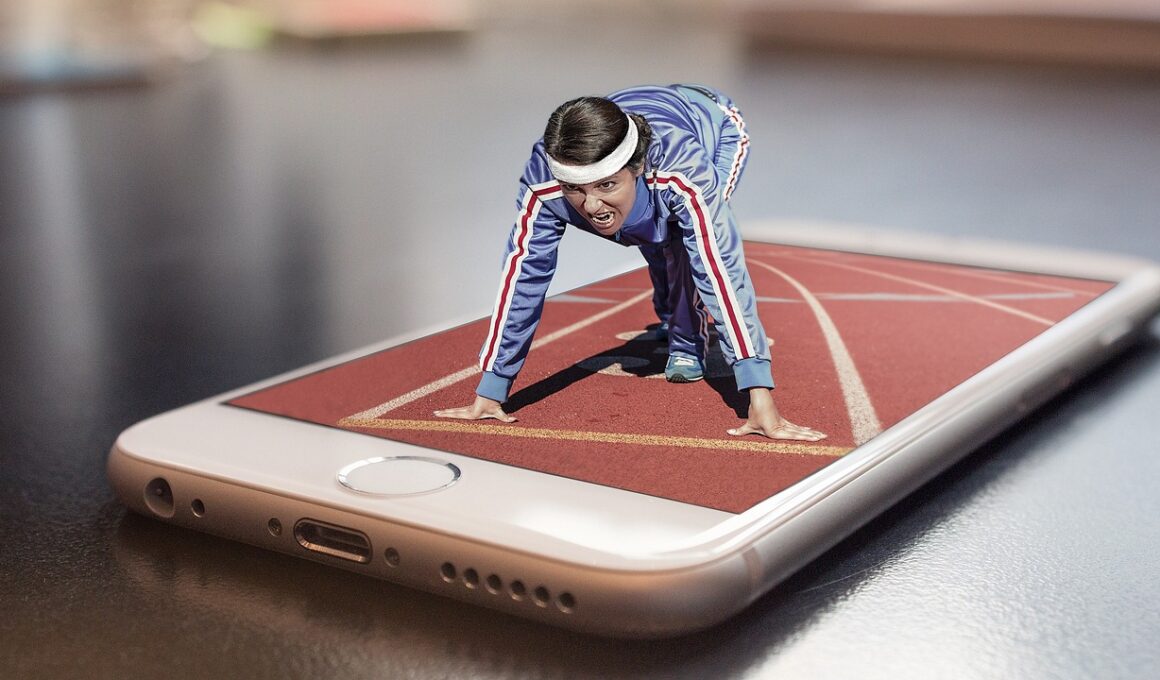The Role of Mobile Apps in Managing Sports Anxiety
In today’s fast-paced sports environment, athletes often encounter significant performance anxiety. This anxiety can manifest before competitions and during high-pressure situations, potentially hindering performance. Fortunately, mobile apps have emerged as powerful tools to assist athletes in managing their psychological well-being. By providing real-time resources and techniques, these applications help athletes better prepare themselves mentally. Apps like Headspace and Calm offer guided meditation, which encourages mindfulness practices. Mindfulness can enhance focus while reducing anxiety and improving overall mental health. Additionally, apps focused on sport-specific strategies enable users to customize their mental training routines. By addressing the unique aspects of their sport, athletes can cultivate mental resilience. Mobile technology also supports the practice of visualization techniques, where athletes can imagine their successes and improve their confidence. Through consistent use of these applications, athletes often report lower stress levels and enhanced concentration. The integration of technology in sports psychology represents a significant shift in how athletes approach mental health. Therefore, utilizing these apps could reshape training and competition experiences for improved athletic performance.
Building mental strength is essential for athletes who face challenges, such as injuries or losses. Mobile apps play a vital role in providing strategies for coping with these adversities. Many applications include mental exercises and resources that athletes can access anytime. This accessibility ensures that psychological support is always available, no matter the situation. Coaches and sports psychologists are recognizing the value of integrating technology into traditional coaching. By encouraging the use of these apps, coaches can help athletes develop better coping mechanisms. In addition to resources for managing anxiety, many apps emphasize positive reinforcement by tracking progress. Athletes can set goals and visualize their journey, which fosters a sense of achievement. Furthermore, certain applications offer community features. These features allow athletes to connect with others experiencing similar challenges, promoting social support. Sharing stories and strategies can help alleviate anxiety, as athletes realize they are not alone. Overall, mobile apps contribute to cultivating a supportive network that enhances mental health in sports. Implementing these technologies, athletes can build resilience and better navigate the ups and downs of their athletic careers.
In addition to mental training techniques, mobile apps also provide essential tools for performance analysis. These tools help athletes establish connections between their mental state and performance levels. For example, some apps enable users to log their emotions and correlate those feelings with their sporting performances. This data collection empowers athletes to recognize patterns in their mental states, offering insight into how emotions impact results. By analyzing this information, they can make informed decisions about adjusting their mental approaches. Moreover, the integration of biofeedback technology in some apps allows athletes to monitor physiological responses to stress. The physiological data can include heart rate variability or breathing patterns. Understanding these bodily signals helps users manage anxiety more effectively. In the long term, such integration between technology and psychological training fuels personal growth. It creates a feedback loop that reinforces self-awareness and proactive management of sports anxiety. Ultimately, athletes who utilize performance analysis tools alongside mental training strategies are better positioned to navigate high-pressure situations. The blend of technology and psychology empowers athletes towards achieving peak performance consistently.
Tailored Mental Health Resources
The diversity of mobile sports psychology apps allows for tailored mental health resources specific to each athlete’s needs. Numerous applications provide content focused on various aspects of mental training, from relaxation techniques to goal-setting strategies. Athlete preferences may vary, influencing their choice of app features. Some athletes may prefer guided imagery, while others may resonate more with self-reflection journal tools. This variety caters to different learning styles, enhancing user experience. Furthermore, many apps regularly update content, offering fresh techniques and strategies aligned with the latest research in sports psychology. This ensures that athletes have access to cutting-edge tools improving their performance continuously. Additionally, some applications employ machine learning algorithms to recommend techniques based on usage patterns. For those athletes who struggle with anxiety, finding the right approach can significantly impact their performance. By personalizing resources and experiences, mobile applications effectively bridge the gap between technology and psychological support. Customization allows athletes to be proactive about their mental health, ensuring they have refuge from anxiety while striving for excellence in their field.
Mobile apps also serve as platforms for tracking mental health progress, ensuring athletes stay consistent in practice. By logging their thoughts, feelings, and achievements, users gain valuable insights into their mental wellness journey. Tracking progress aids athletes in identifying triggers for anxiety, ultimately equipping them with the knowledge to intervene when needed. Additionally, many apps offer reminders and motivational prompts, prompting athletes to maintain their mental training routines. This structured approach reinforces commitment by establishing positive habits. Regularly engaging with psychological exercises can foster a sense of routine and control, which is crucial for anxiety management. Athletes who consistently utilize these features often see improvements not only in their mental well-being but also in their overall performance. Motivation derived from their progress adds a layer of positivity to their training regimen. Supportive features available in mobile apps, such as achievements and inspirational quotes, serve as additional encouragement. These tools combine to create a dynamic platform for personal growth and sports advancement, allowing athletes to thrive under pressure while achieving their goals.
The Future of Mobile Apps in Sports Psychology
As technology continues evolving, the future of mobile apps in sports psychology looks promising. Developers are creating increasingly sophisticated applications equipped with diverse features aimed at enhancing mental resilience among athletes. Advances in artificial intelligence promise to push the boundaries of personalized mental training experiences. Future applications may utilize AI to provide even more tailored advice based on data analysis of an athlete’s performance, emotional state, and feedback. The integration of virtual reality (VR) into mobile platforms could also be a game changer, allowing athletes to practice mental techniques in immersive environments. Furthermore, the potential for cross-functional collaborations between psychologists, tech developers, and athletes opens up new avenues for creating impactful content. These collaborations can lead to innovative strategies that combine technical rigor with psychological expertise. By embracing trends in technology, those creating apps can offer unparalleled tools for anxiety management. Observing these developments will be crucial for athletes, coaches, and psychologists navigating this digital landscape. Continuous growth and development in mobile apps promise enhanced support for all involved in sports psychology.
The impact of mobile apps on managing sports anxiety is profound and can reshape traditional approaches to mental training. With athletes increasingly turning to technology for assistance, the industry must acknowledge and support these tools. Coaches and sports psychologists should actively incorporate mobile applications into training regimens and consider their potential benefits. Offering guidance on selecting appropriate apps and integrating them into daily routines will enhance their effectiveness and accessibility. In doing so, athletes can optimize their mental training while pursuing excellence in their respective sports. Furthermore, as the world of sports psychology advances, the focus on managing anxiety through technology will likely grow, fostering an environment conducive to mental well-being. Encouraging open discussions around the use of technology in sports psychology can also destigmatize mental health issues within athletic communities. By validating the importance of psychological support, societies can cultivate healthier sporting cultures. Embracing the blend of technology and psychology can create lasting positive change, equipping athletes with the necessary tools to succeed amidst pressure. As this integration continues, athletes are bound to experience a transformation in their mental health management and performance.


